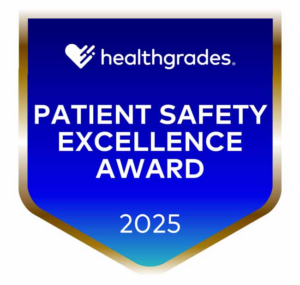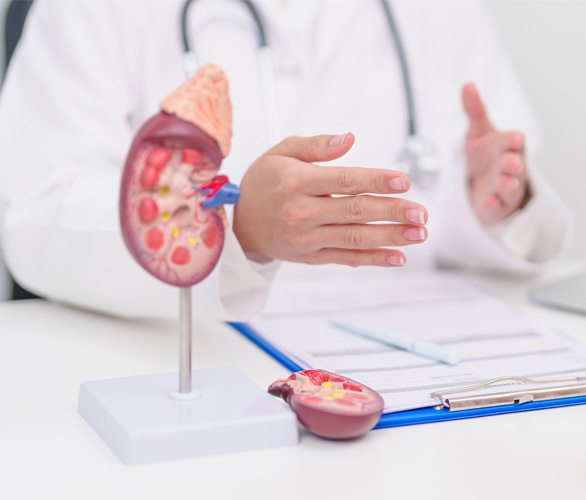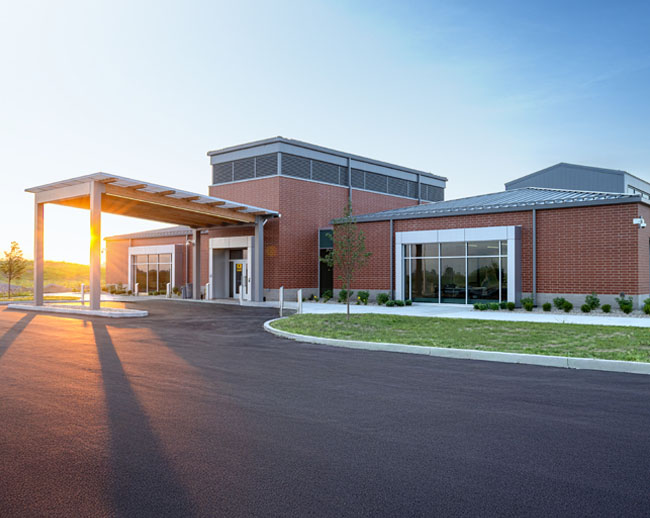Urology
Henry Community Health Urology provides expert diagnosis, treatment, and care for conditions affecting the urinary tract and male reproductive system. Our board-certified urologist combine advanced medical expertise with compassionate patient care to address both common and complex urological conditions. From routine screenings to complex surgical interventions, our urology department is committed to helping patients achieve optimal urological health and improved quality of life.
Designations
- Healthgrades 2025 Patient Safety Excellence Award™
- CHIME Digital Health Most Wired Awards, Acute & Ambulatory, 2020–2025




Now Scheduling!
Henry Community Health Urology is set to open October 2025 at our new Knightstown campus! Schedule your appointment now at 765-599-3888.
Conditions
We understand that urological conditions can be sensitive and personal. Our team creates a comfortable, confidential environment where patients feel respected and heard. We take time to explain conditions and treatment options clearly, ensuring patients are fully informed and involved in their care decisions.
Our experienced team manages a wide range of urological conditions including:
- kidney stones
- urinary tract infections
- bladder disorders
- prostate conditions
- erectile dysfunction
- male infertility
- incontinence
- urological cancers affecting the kidneys, bladder, prostate, and testicles.
 Treatments
Treatments
We offer state-of-the-art treatment modalities including:
- minimally invasive surgical techniques
- laser therapy
- shock wave lithotripsy for kidney stones
- innovative approaches to cancer treatment
Our focus on minimally invasive methods means faster recovery times, reduced pain, and better outcomes for our patients.
FAQs about Urology
Previously, Henry Community Health had partnered with an outside organization to bring Urology services to the Henry County community. In the fall of 2025, Henry Community Health decided to expand our service line and create Henry Community Health Urology.
Screening for prostate cancer usually involves a PSA (prostate-specific antigen) blood test and a digital rectal exam (DRE). Most guidelines (such as the American Urological Association and USPSTF) recommend shared decision-making starting at age 50 for men at average risk. If you are African American or have a family history of prostate cancer (father, brother, or multiple relatives), discussions should begin earlier, often around age 40–45. The decision depends on your age, health, risk factors, and preferences.
If you notice trouble starting urination, a weak or interrupted stream, frequent trips to the bathroom, blood in your urine, or pelvic discomfort, it may be related to your prostate. While these symptoms are common with age, they should never be ignored. A urologist can help determine the cause and provide treatment options.
Common causes include:
- Benign prostatic hyperplasia (BPH): prostate enlargement that restricts urine flow.
- Excess fluid intake in the evening, especially caffeine or alcohol.
- Medical conditions like diabetes, sleep apnea, heart failure, or certain medications (e.g.,
diuretics). - Bladder overactivity or infection.
If it’s bothersome, a urologist can check your prostate, bladder, and urine, and suggest tailored treatment (lifestyle changes, medications, or procedures).
An enlarged prostate, or benign prostatic hyperplasia (BPH), can make it harder for urine to flow. Signs include difficulty starting, a weak stream, dribbling after urination, urgency, and waking up multiple times at night. A simple exam and urine test can help confirm the cause.
Even a single episode of visible blood in the urine should be taken seriously. Causes range from infections and kidney stones to more serious conditions like bladder or kidney cancer. If you notice blood, schedule an evaluation promptly.
If you are unable to pass urine at all, this is a medical emergency. Seek care right away, either by calling your doctor’s office or going to the emergency department.
ED can be caused by vascular issues, nerve problems, hormones, medications, or stress. First steps:
- Lifestyle: improve sleep, exercise, quit smoking, limit alcohol, maintain healthy weight.
- Medical review: check for diabetes, low testosterone, high blood pressure, or medication
side effects.
Treatment options may include:
- Oral medications (PDE5 inhibitors like sildenafil/Viagra, tadalafil/Cialis).
- Vacuum devices, injections, or surgical implants if pills don’t work.
- Counseling if stress, anxiety, or relationship issues play a role.
Kidney stone prevention depends on stone type, but general strategies are:
- Hydration: Drink enough water to produce at least 2–2.5 liters of urine/day.
- Dietary adjustments:
- Limit excess salt and animal protein.
- Avoid very high doses of vitamin C.
- Don’t overly restrict calcium—normal calcium intake is protective.
Medical management: If stones recur, a urologist may order a 24-hour urine test to tailor prevention (e.g., thiazide diuretics for calcium stones, citrate supplements for uric acid or calcium oxalate stones).
Often benign, but evaluation can rule out infection, inflammation, or rarely cancer. Although alarming, blood in semen is often not serious. It can result from inflammation, infection, or irritation of the prostate or seminal vesicles. Rarely, it may indicate a more significant problem. If it persists, a urologist can provide reassurance and treatment.
Yes. Low testosterone can cause fatigue, low sex drive, decreased muscle mass, mood changes, and trouble concentrating. If you’re experiencing these symptoms, a simple blood test can help determine if testosterone is a factor, and treatments are available.
Locations
Call to schedule an appointment at which location is closest to you.
